
The SEO has transformed dramatically in 2025, with artificial intelligence reshaping both how we optimize content and where that content gets discovered. While traditional search engines remain important, the rise of AI-powered search platforms like ChatGPT, Perplexity, Google's AI Overviews, and Claude has created an entirely new optimization frontier called Generative Engine Optimization (GEO).
This guide explores the 11 best AI tools for SEO of 2025, including both classic optimization platforms and the new wave of GEO tools. Whether your goal is to improve visibility in Google’s search results or appear in ChatGPT’s answers, these solutions showcase the latest advancements in search optimization technology.
Understanding the AI SEO Revolution
The numbers tell a compelling story about the shift happening in search. According to recent industry data, ChatGPT reached more than 800 million weekly users. Google's AI Overviews appear on at least 13% of all search results, showing up for more than half of the keywords tracked by major SEO platforms.
Bottom Line Up Front: The most successful SEO strategies in 2025 combine traditional optimization with AI search optimization. Businesses that adapt their tool stack now will have significant advantages over competitors still focusing exclusively on traditional SEO approaches.
This evolution has created two parallel optimization strategies:
Traditional SEO Enhancement: Using AI tools to create better content, research keywords more effectively, and optimize for conventional search engines like Google, Bing, and Yahoo.
Generative Engine Optimization (GEO): Optimizing content specifically to be cited and referenced by AI-powered search engines and language models when they generate responses to user queries.
Key Implementation Insight: Start with traditional AI SEO tools to build a strong foundation, then layer in GEO capabilities as budget and expertise grow. Most businesses can see immediate results from tools like ContentShake AI or NeuronWriter before investing in premium GEO platforms.
Emerging GEO (Generative Engine Optimization) Tools
1. Atomic AGI
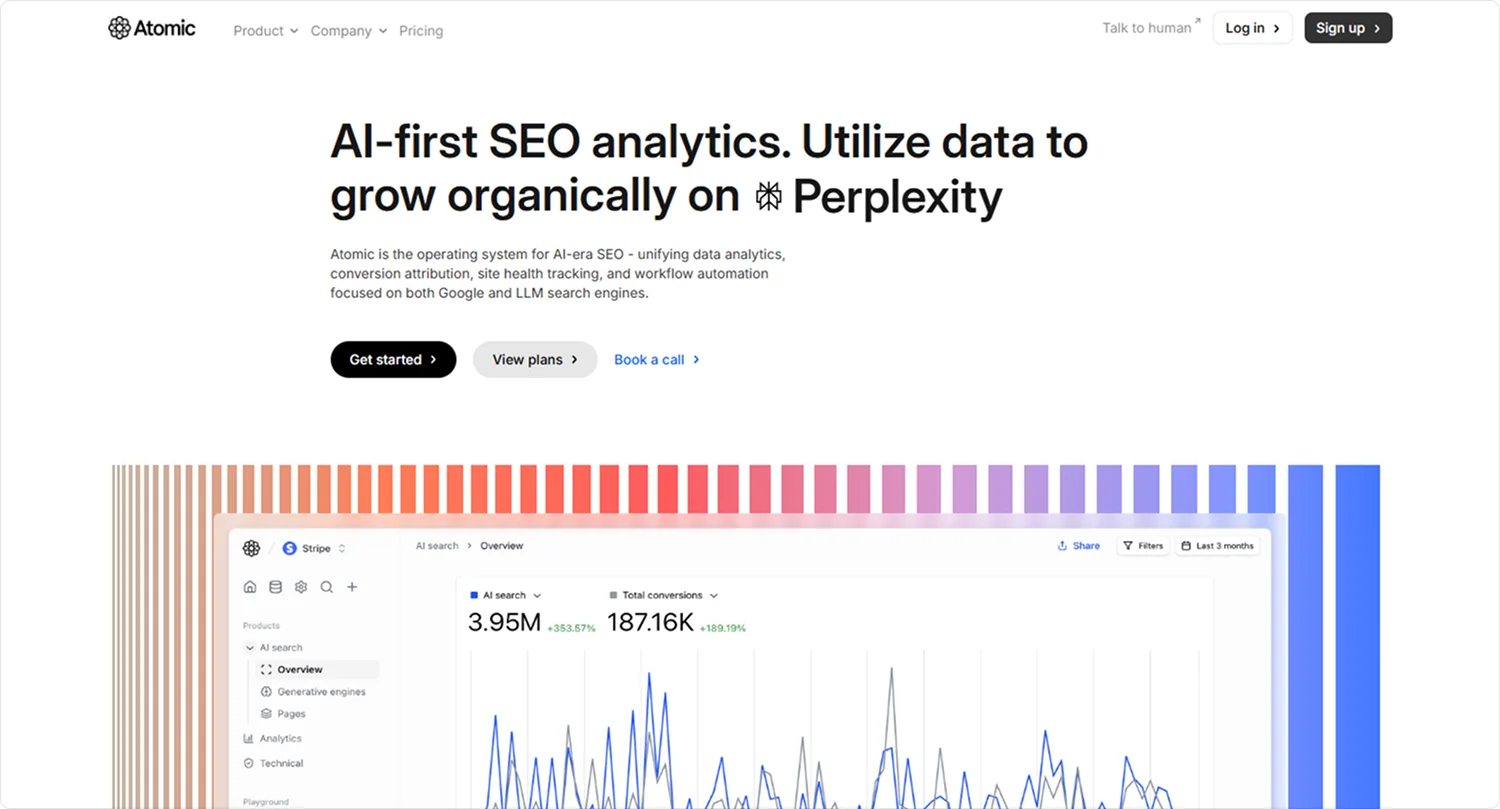
Atomic AGI is an AI-driven SEO analytics and attribution platform designed to help teams track and boost their visibility across Google and the growing ecosystem of generative search engines like ChatGPT, Perplexity, Gemini, and Claude. It combines AI search tracking, traditional SEO analytics, technical site health monitoring, and conversion attribution in a single, easy-to-use workspace that’s quick to set up. With built-in privacy safeguards such as GDPR compliance and EU-based hosting, plus straightforward integrations, Atomic AGI enables marketing teams to start capturing AI search insights in just minutes.
Key features:
- AI Search / Answer-Engine Tracking: Maps when and how your pages and specific paragraphs are surfaced by generative engines.
- Text Intelligence & NLP Scoring: Paragraph-level optimization scores, topical authority recommendations, and entity gap detection.
- AI-Citation & Prompt Visibility: Shows which sentences are cited or paraphrased by LLMs and which user prompts surface your content.
- Unified Analytics & Attribution: Combines AI referral data with GSC/GA4 and conversion events so text optimizations link to revenue.
- Technical SEO & Rapid Indexing: Automated audits, indexing checks, and recommendations to help LLMs consume your content.
- Reporting & Collaboration: Shareable, actionable reports that explain AI search trends at the sentence and page level.
Pricing: Free tier to get started; paid plans from Starter ($10/month) to Team and Enterprise with expanded data, crawl credits and custom pricing.
2. AthenaHQ
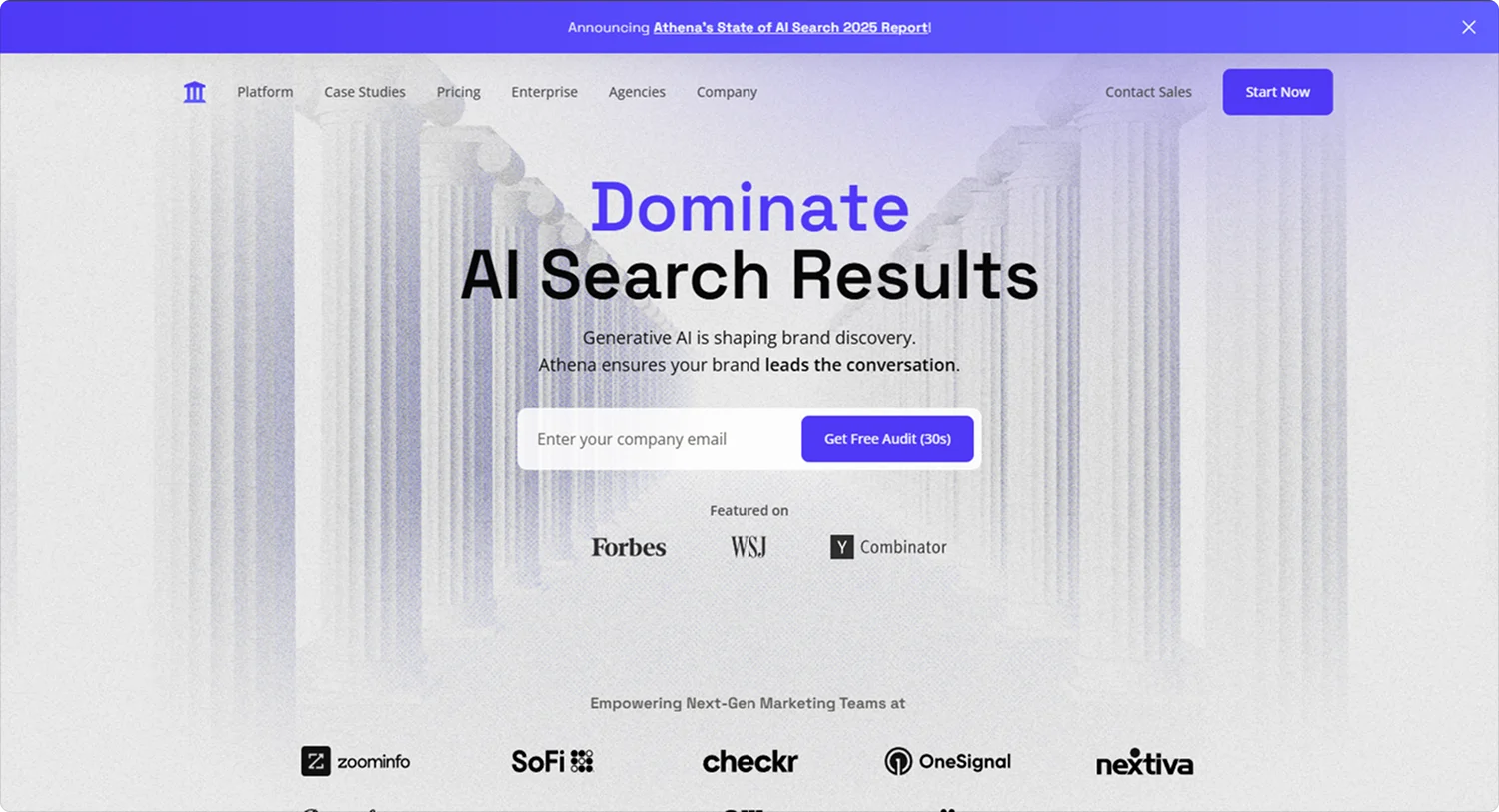
Pricing: $295/month, with custom enterprise pricing
Best For: Enterprise organizations serious about AI search optimization
AthenaHQ represents the premium tier of GEO platforms, founded by former Google Search and DeepMind experts. The platform focuses specifically on optimizing content for AI-powered search engines like ChatGPT, Perplexity, Claude, and Google's AI Overviews.
Key Features:
- Comprehensive AI search engine monitoring
- Share of Voice tracking across AI platforms
- Competitor benchmarking in AI search results
- Sentiment analysis of AI-generated mentions
- AI-generated action center with optimization recommendations
- Multi-language and geo-based AI search tracking
3. Writesonic
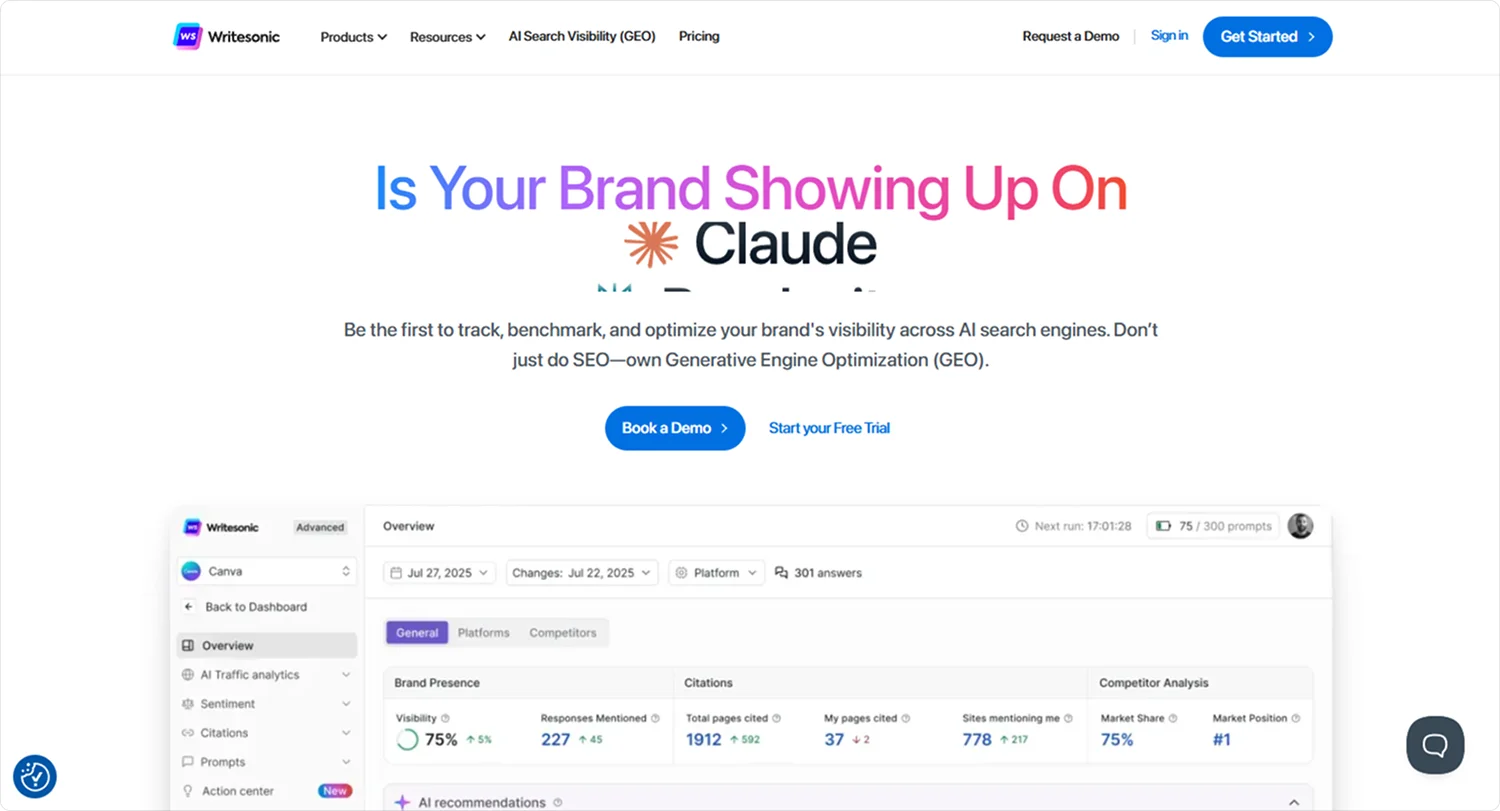
Pricing: AI Search Tracking features start from $199/month.
Best For: Small to medium businesses entering GEO optimization
Writesonic has expanded beyond AI writing to include comprehensive GEO capabilities, offering a more accessible entry point into AI search optimization than enterprise-focused platforms.
Key Features:
- AI search visibility tracking across major platforms
- Brand mention monitoring and sentiment analysis
- Content optimization recommendations for AI search
- Integration with Writesonic's content creation suite
- Traffic analytics specifically for AI-generated referrals
- Competitive analysis for AI search positioning
4. Otterly
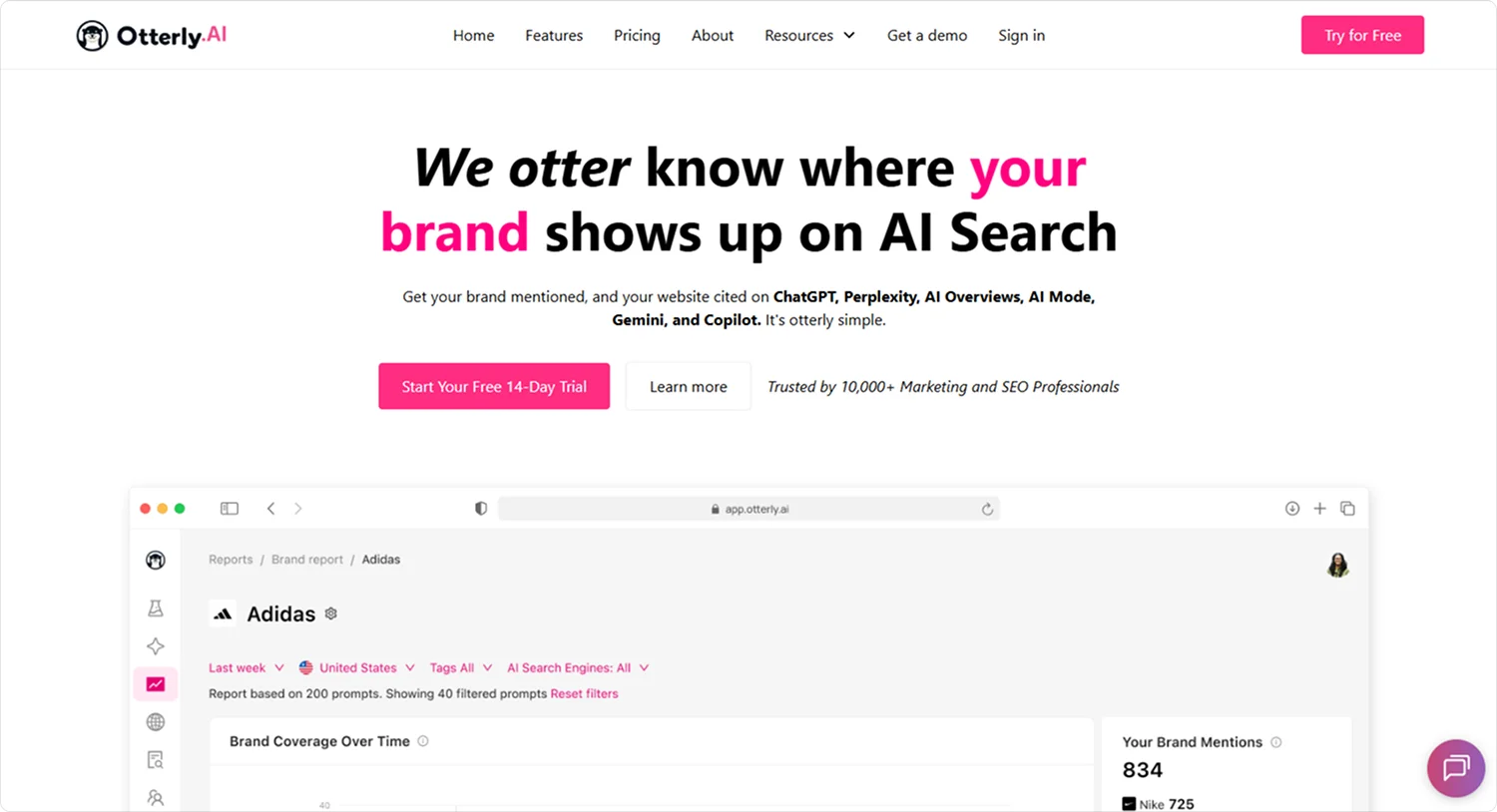
Pricing: Lite Plan $29/month for monitoring 15 prompts, with $489/month for 400 prompts
Best For: Businesses focused on prompt-level AI rankings and brand safety
Otterly takes a focused approach to GEO, specializing in prompt-level monitoring and brand mention tracking across AI search platforms. The platform emphasizes actionable insights rather than comprehensive analytics.
Key Features:
- Prompt-level AI search ranking monitoring
- Automated link citation detection in AI responses
- AI prompt discovery based on user search behavior
- Sentiment analysis and mention frequency tracking
- Weekly trend reports and ranking change alerts
Best AI-Enhanced Traditional SEO Tools
5. Surfer SEO
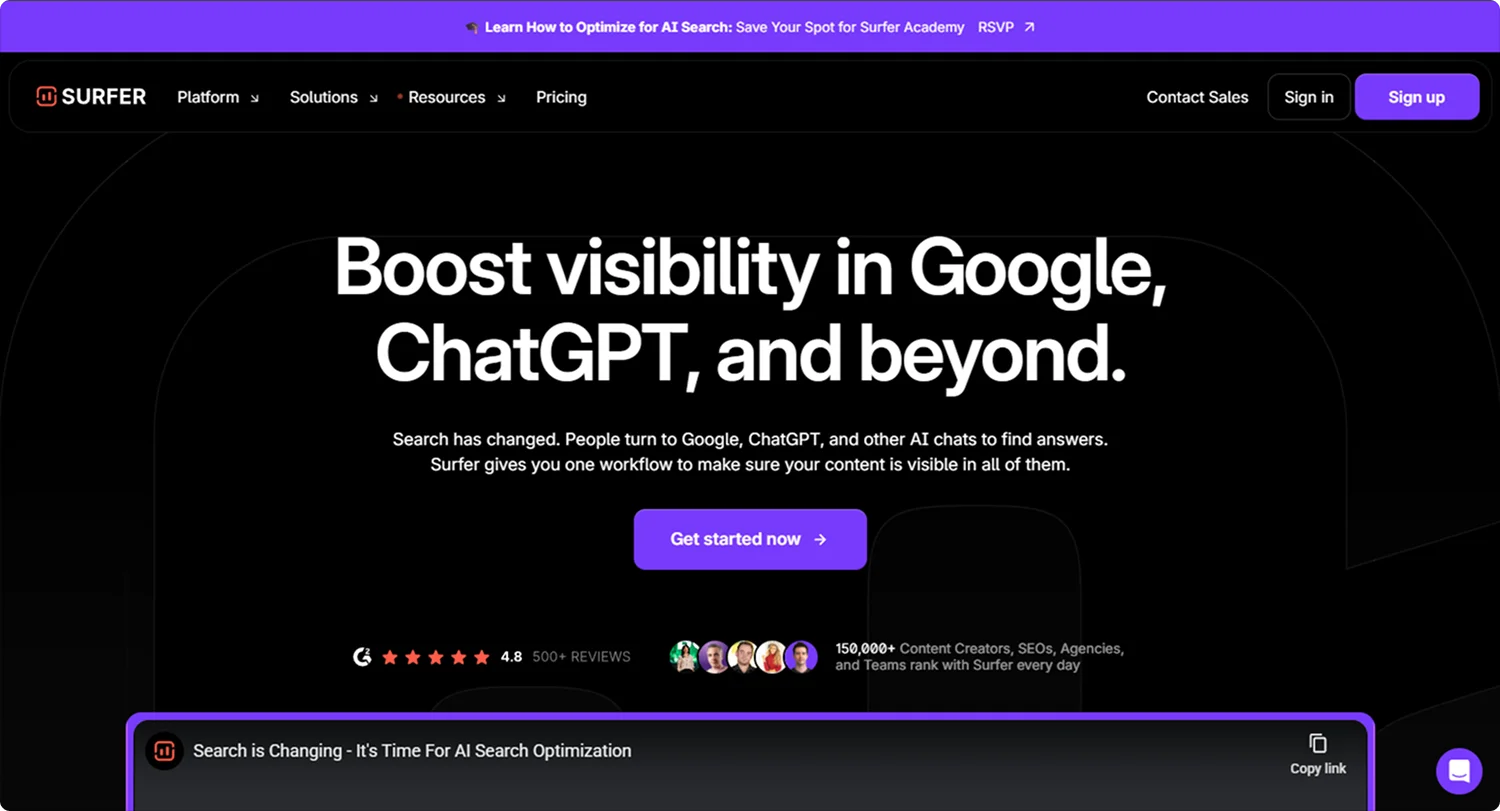
Pricing: Essential Plan starts at $79/month (annually), Scale Plan at $175/month (annually), and Enterprise from $999/month (annually)
Best For: Content teams focused on on-page optimization
Surfer SEO has evolved significantly in 2025, maintaining its position as the gold standard for content optimization while adding powerful AI features. The platform's Content Editor remains its flagship feature, providing data-driven recommendations based on analysis of top-ranking pages.
Key Features:
- Content Editor with real-time optimization scoring
- AI-powered article generation (additional cost of $19 per article)
- SERP Analyzer examining 500+ ranking factors
- Keyword research with personalized difficulty scoring
- Content audit tools for existing page optimization
- Multi-language optimization support
6. Clearscope
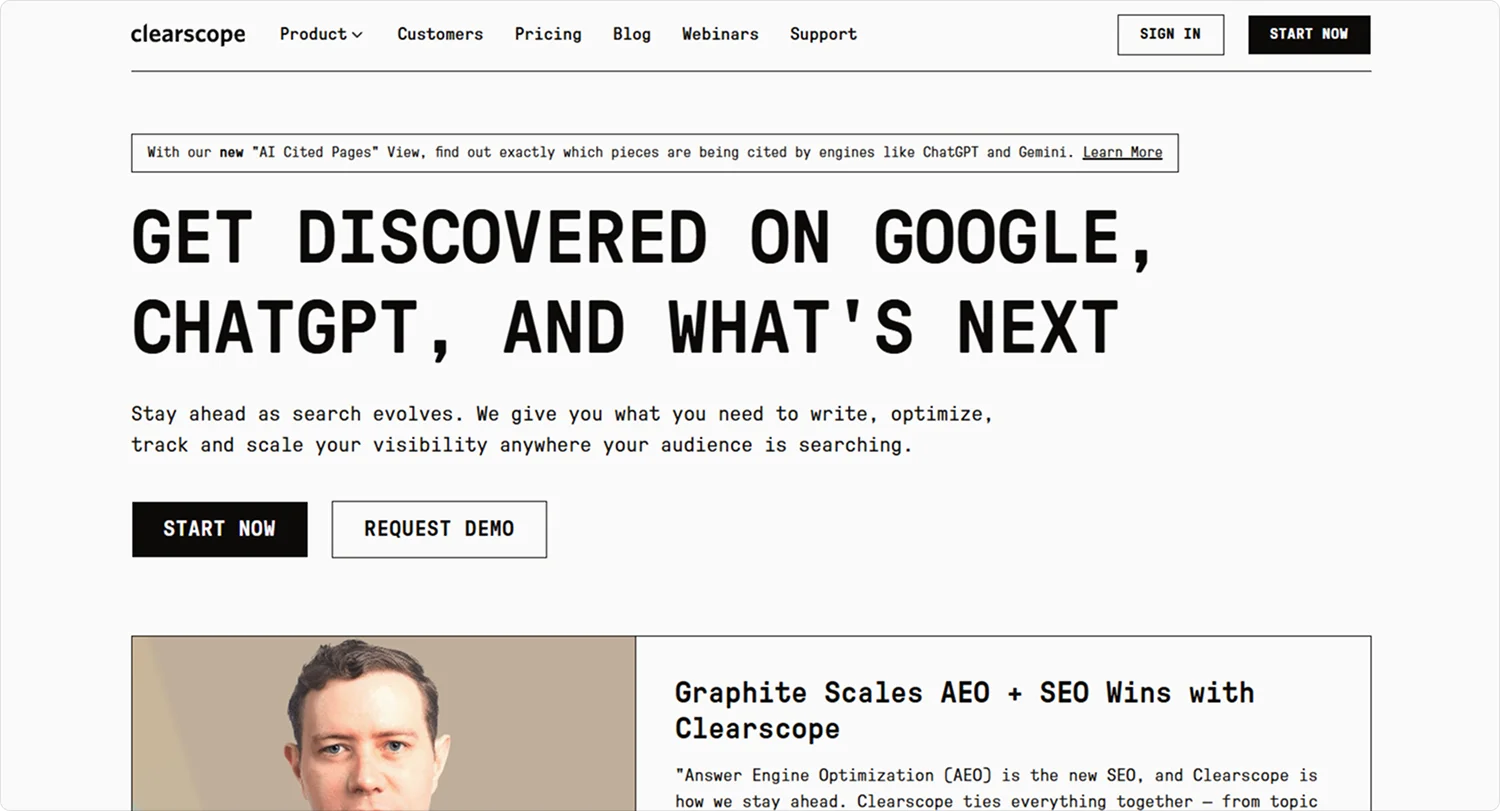
Pricing: Starting from $129/month
Best For: Large content teams requiring workflow integration
Clearscope has refined its approach in 2025, focusing on simplicity and ease of use while maintaining sophisticated NLP-powered optimization capabilities. The platform excels at providing clear, actionable recommendations without overwhelming users with data.
Key Features:
- Streamlined content optimization interface
- NLP-based keyword and topic recommendations
- Unlimited users on all plans
- Google Docs integration
- Content performance tracking
- Multi-language support (5 languages)
7. Frase
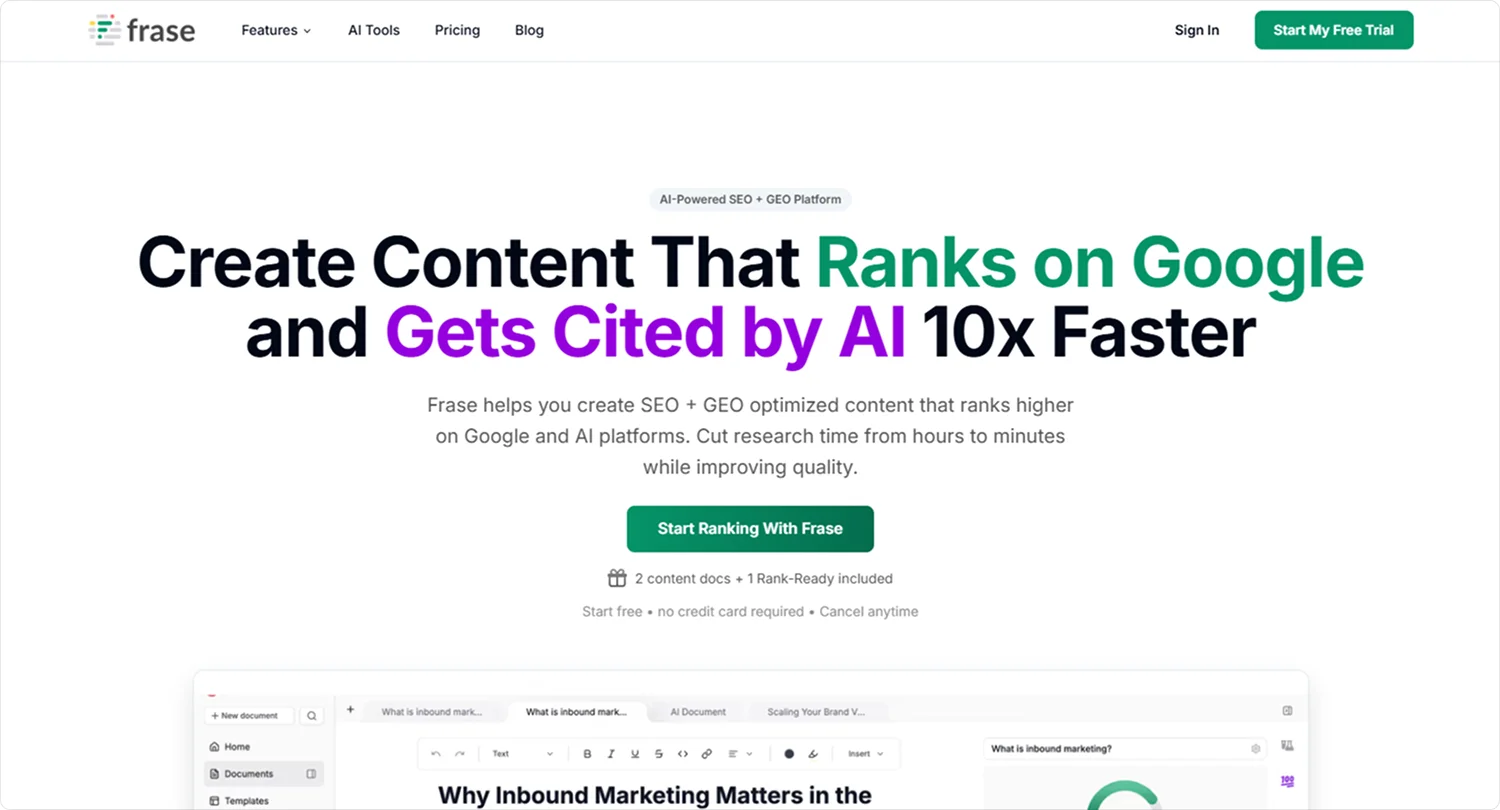
Pricing: Starter plan for $38/month
Best For: Content creators who prioritize research and brief creation
Frase has positioned itself as the research powerhouse of AI SEO tools, excelling at SERP analysis and content brief generation. The platform's approach emphasizes understanding search intent and competitor strategies before content creation.
Key Features:
- Advanced SERP analysis and competitor research
- AI-powered content brief generation
- Question and topic extraction from top-ranking pages
- Content optimization scoring
- AI writing capabilities with research context
- Integration with Google Search Console
8. Jasper
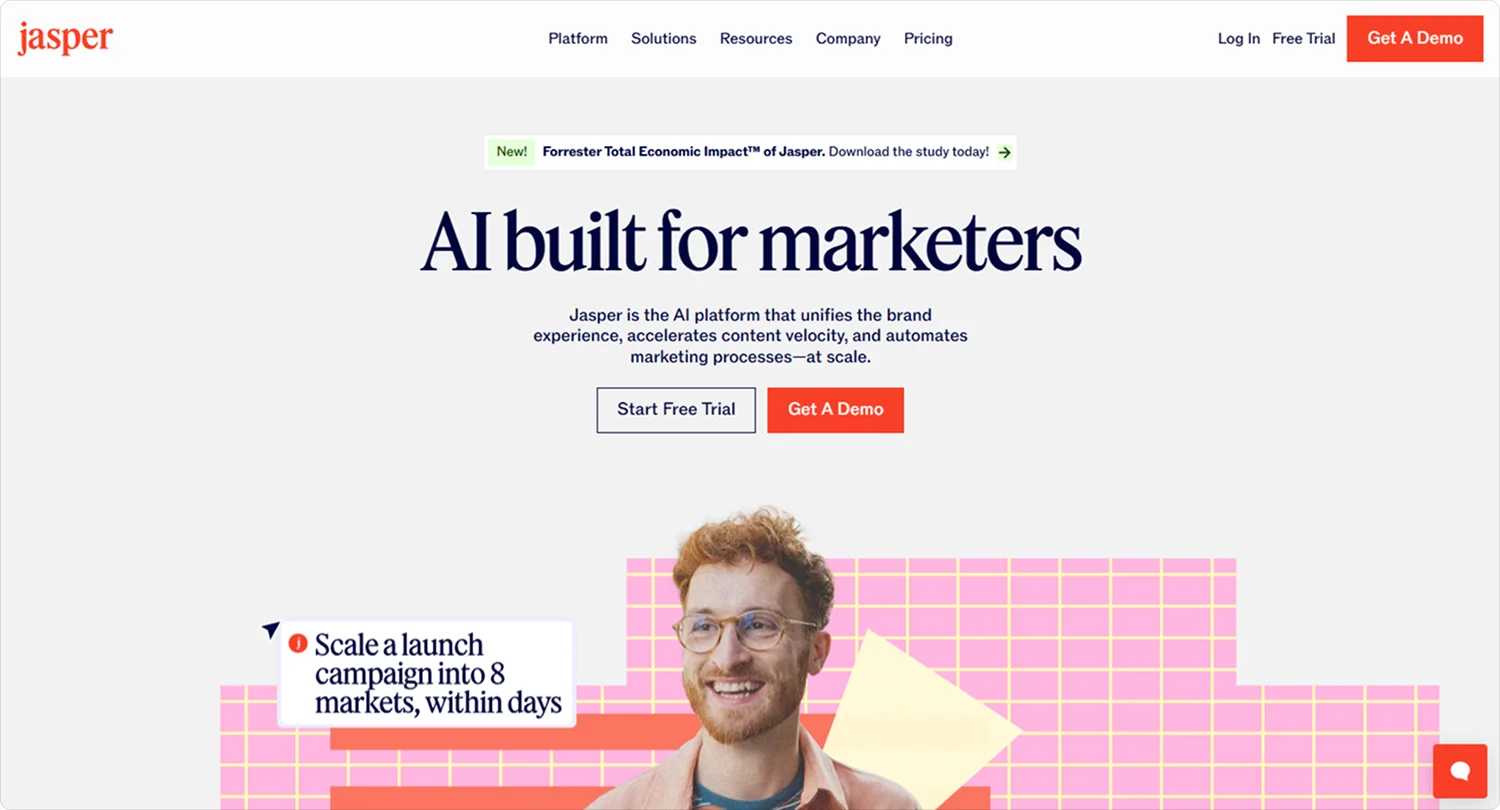
Pricing: Pro Plan $59/month and Business Plan (custom pricing)
Best For: Marketing teams requiring consistent brand voice across content
Jasper has evolved from a general AI writing tool into a comprehensive marketing platform with strong SEO capabilities. The platform's emphasis on brand voice consistency and team collaboration makes it particularly valuable for organizations with multiple content creators.
Key Features:
- Advanced brand voice training and consistency
- 50+ content templates and frameworks
- Team collaboration and workflow management
- Surfer SEO integration for optimization scoring
- Multi-language content generation (30+ languages)
- Chrome extension and Google Docs integration
Specialized and Emerging AI SEO Tools
9. NeuronWriter
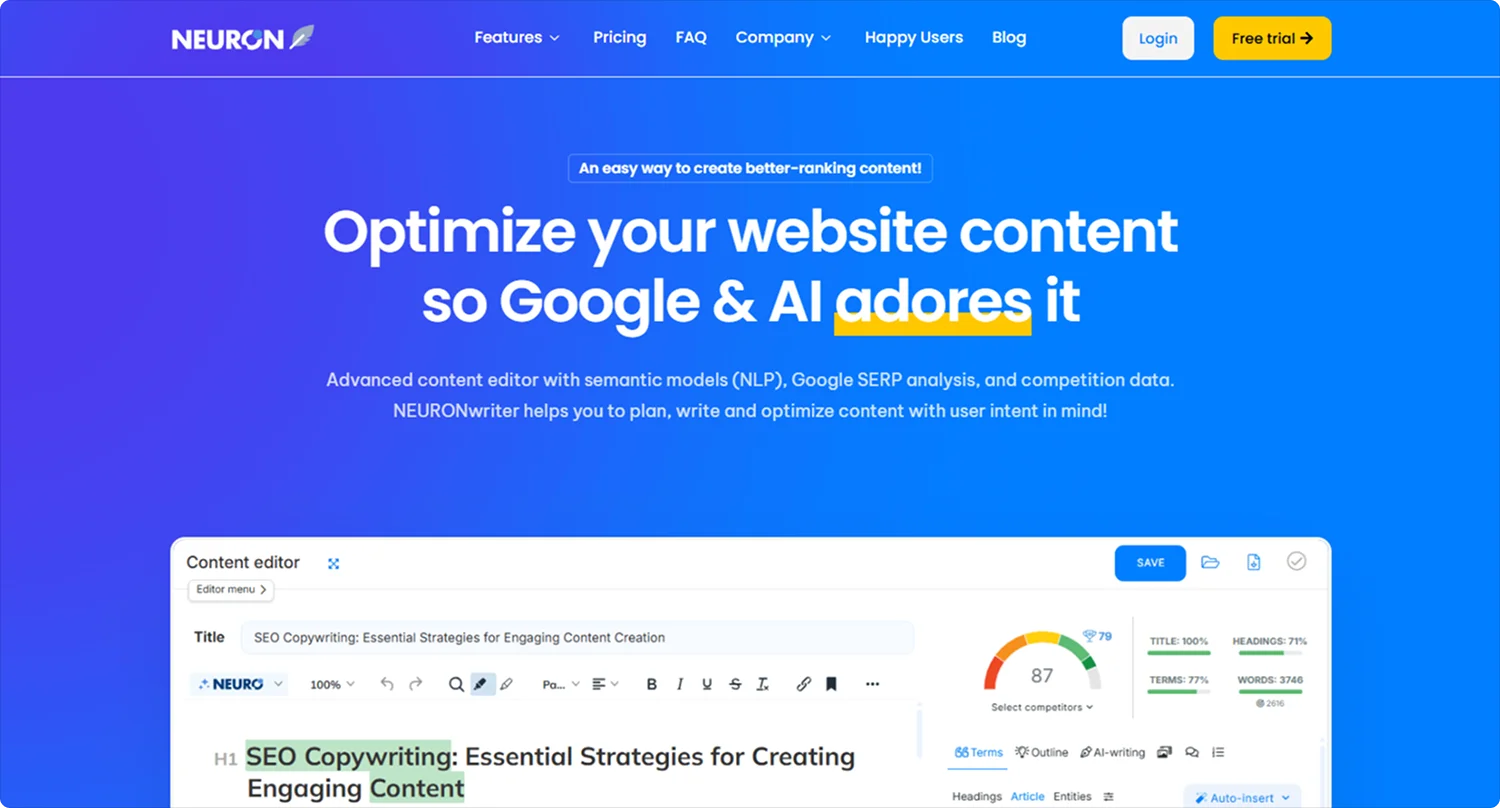
Pricing: Five different plans starting at $19/month
Best For: Individual creators and small teams focused on content optimization
NeuronWriter has gained significant traction as an affordable alternative to Surfer SEO, offering comprehensive content optimization capabilities at a fraction of the cost of premium competitors.
Key Features:
- Real-time content optimization with NLP scoring
- Competitor content analysis and recommendations
- AI writing credits included with all plans
- Content repository and project management
- Google Search Console integration
- Chrome extension for WordPress optimization
10. Scalenut
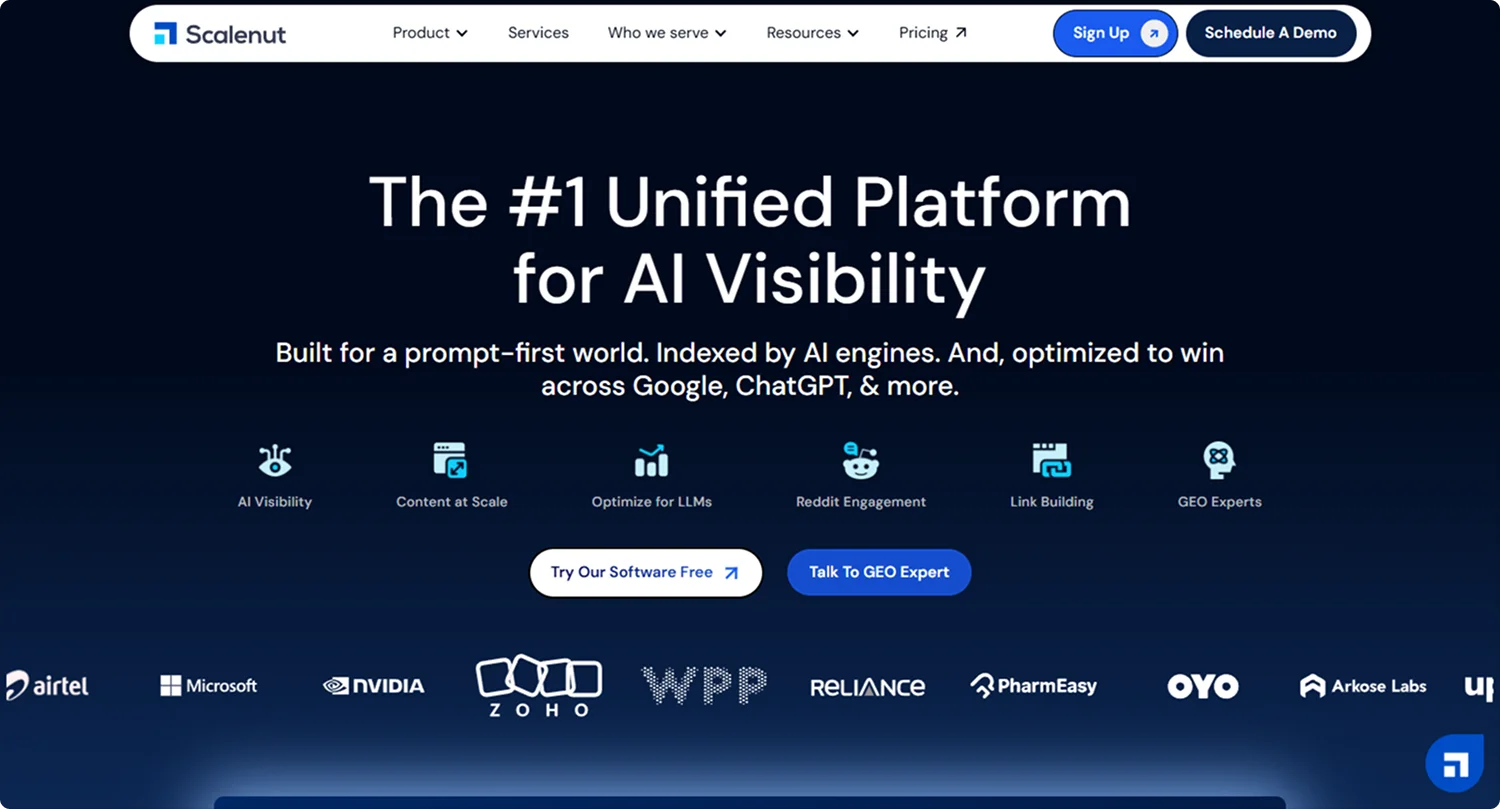
Pricing: Essential Plan $20/month, Growth Plan $32/month, Pro Plan $60/month
Best For: Teams needing end-to-end content marketing automation
Scalenut positions itself as an all-in-one AI-powered SEO and content marketing platform, offering tools for every stage of the content lifecycle from keyword research to optimization.
Key Features:
- AI-powered keyword research and clustering
- Cruise Mode for rapid article generation
- Content optimization with NLP recommendations
- Topic cluster identification and planning
- Traffic analyzer with Google Search Console integration
- 40+ AI writing templates for various content types
11. MarketMuse
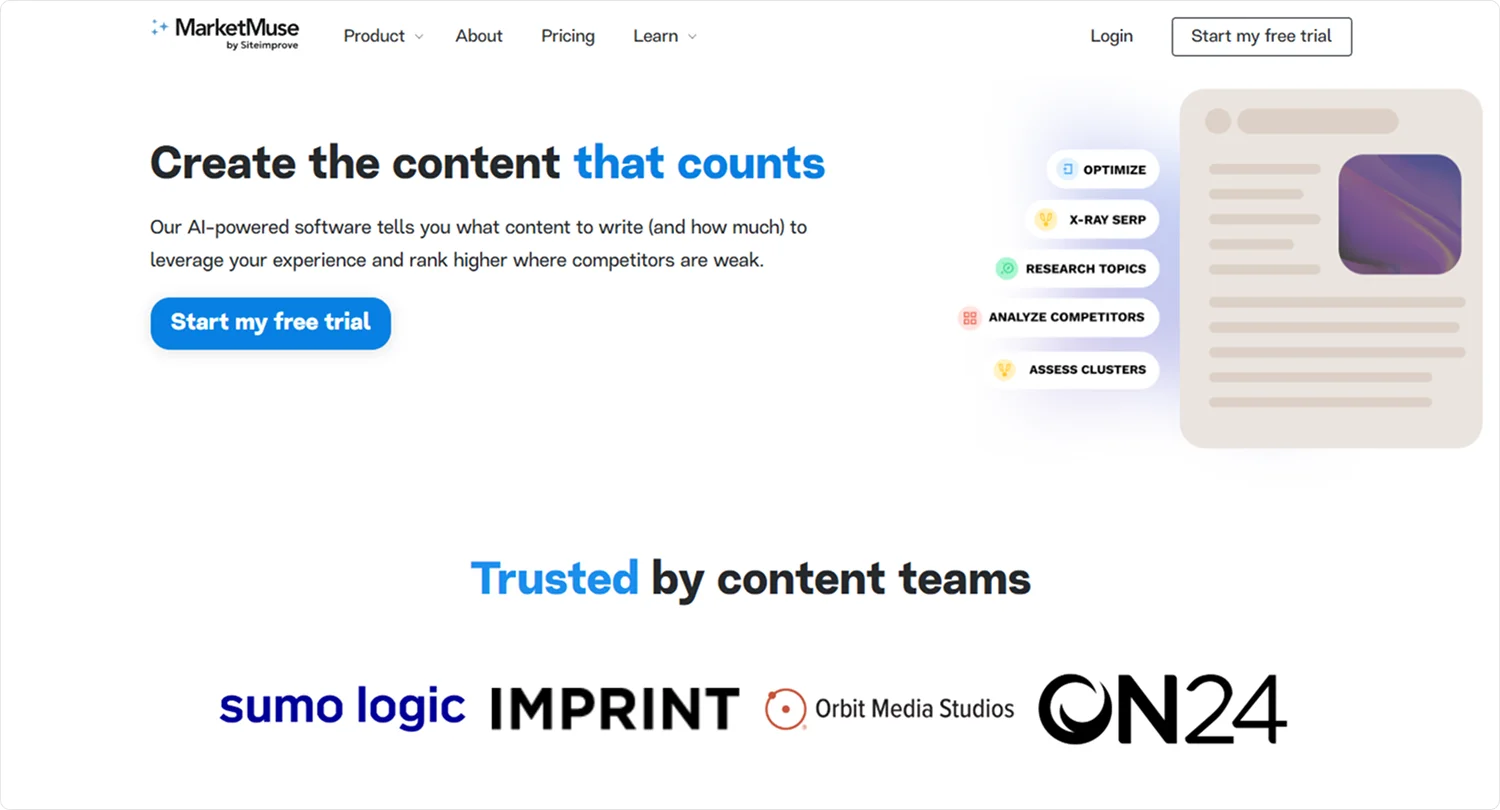
Pricing: Free, Optimize, Research, and Strategy plans avaivable
Best For: Large organizations requiring comprehensive content strategy intelligence
MarketMuse represents the premium tier of content strategy platforms, offering sophisticated analysis and planning capabilities based on topical authority and competitive intelligence.
Key Features:
- Comprehensive content inventory and gap analysis
- Topical authority scoring and optimization
- Competitive content strategy analysis
- Content cluster identification and planning
- Personalized keyword difficulty scoring
- Advanced content performance analytics
Advanced Implementation Best Practices
Getting Started with AI SEO Tools
1. Audit Current Performance: Before implementing new tools, establish baseline metrics for organic traffic, keyword rankings, and content performance.
2. Choose Core Platform: Select one primary tool for content optimization rather than trying to use multiple overlapping solutions.
3. Integrate Workflows: Ensure chosen tools integrate with existing content management systems and team workflows.
4. Train Team Members: Invest in proper training for team members to maximize tool effectiveness and avoid common pitfalls.
Pro Tip: Most successful implementations start with optimizing existing high-traffic content rather than creating new content. This provides faster results and better ROI demonstration.
Optimizing for Both Traditional and AI Search
Content Structure: Create comprehensive, well-structured content that serves both search engines and AI models looking for authoritative information to cite.
Entity Optimization: Focus on clear entity definitions and relationships, as AI models rely heavily on understanding entities when generating responses.
Question-Answer Format: Include FAQ sections and direct answers to common questions, as these formats align well with how AI models structure responses.
Source Attribution: Ensure content includes proper citations and references, as this builds authority signals that both traditional search engines and AI models value.
Measuring Success
Traditional SEO Metrics: Continue tracking organic traffic, keyword rankings, click-through rates, and conversion metrics from search engines.
AI Search Metrics: Monitor brand mentions in AI-generated responses, share of voice in AI platforms, and traffic referred from AI search interfaces.
Content Performance: Track how optimized content performs across both traditional search results and AI citation rates.
ROI Analysis: Measure the business impact of AI SEO tool investments through lead generation, conversion improvements, and content creation efficiency gains.
Conclusion
The best AI tools for SEO in 2025 fall into two distinct categories: traditional SEO enhancement tools and emerging GEO platforms. Today's success requires understanding both approaches and implementing tools that serve your specific business needs and budget constraints.
The key is choosing tools that integrate well with existing workflows, provide measurable results, and position your content for success in both current search environments and the AI-powered future of search discovery. Whether you're optimizing for Google's algorithm or ChatGPT's responses, the right combination of AI-powered SEO tools will help you maintain and grow your search visibility in 2025 and beyond.
The search revolution is here, and businesses that adapt their tool stack and optimization strategies now will have significant advantages over competitors still focusing exclusively on traditional SEO approaches. The future of search is both traditional and AI-powered; and your tool selection should reflect this reality.
Get started with Atomic today, and earn your place in today's AI-driven discovery channels, backed by data, not guesses.
Frequently Asked Questions
1. How long does it take to see results from AI SEO tools?
Most users see initial improvements within 4-6 weeks of implementing optimization recommendations. Content created with AI SEO tools typically begins ranking within 2-3 months, with significant traffic improvements visible after 3-6 months of consistent use.
2. Can AI SEO tools replace human SEO expertise?
No, AI SEO tools enhance human expertise rather than replace it. They handle data analysis, competitor research, and optimization suggestions, but human judgment is still needed for content strategy, technical implementation, and interpreting results. The best results come from combining AI efficiency with human creativity and strategic thinking.
3. How do AI SEO tools handle Google's helpful content updates?
Quality AI SEO tools incorporate Google's E-E-A-T guidelines and helpful content signals into their recommendations. They emphasize user-focused content creation rather than just keyword optimization, aligning with Google's quality standards.
4. Should I invest in GEO tools if ChatGPT and AI search are still growing?
Yes, especially for B2B companies and brands where early visibility in AI search can provide competitive advantages. With 400+ million weekly ChatGPT users and growing adoption of AI search, early investment in GEO positioning can pay significant dividends as the market matures.
5. What's the biggest mistake people make when choosing AI SEO tools?
Choosing tools based on features rather than workflow integration. The best tool is one that fits seamlessly into your existing content creation process and team structure. Also, many people try to use too many tools simultaneously instead of mastering one primary platform first.














